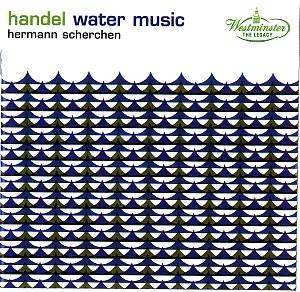I heard this Water Music on the radio
in the late 1970s and found it weird and rather wonderful. The
idea seemed to be to play the fast ones slow (both Hornpipes have
a dainty, rather hesitant gait), the slow ones fast (the Air in
F is a bouncy, jaunty affair), and to toss a coin to decide whether
to take the medium ones very fast or very slow (usually the latter,
such as the long drawn-out no.10 in D minor, and the performance
ends with the Minuet in D treated as a broad patriotic hymn).
But, and it is an important ‘but’, having started with the premise
of the strangest tempi imaginable, Scherchen then obtains such
refinement of phrasing, such rhythmic poise, such élan
in the fast movements, that you begin to wonder if he isn’t right
after all.
This is how I heard it some twenty-five years
ago. Does it sound any different now? Well, a lot of water has
gone under the Handelian bridge since then, let alone since 1960
when the record was made. In those days Beecham was still around
to ply his "Love in Bath" and other Handel arrangements,
and George Szell rolled up in London to record the Water Music
and the Royal Fireworks Music in the Harty arrangements (of which
Sir Malcolm Sargent had also made an early stereo coupling) without
anyone seeing anything wrong with it (maybe because there wasn’t).
The Sargent was issued in 1959, the Szell in 1962. And yet by
that time the Boyd Neel version from the early 1950s was growing
old on the Ace of Clubs label, and that had shown there was another
way to do it, with the original orchestration, a small group,
flowing tempi and springy rhythms. If Sargent and Szell remained
unrepentant, the message was not lost on other conductors of international
fame. To Eduard van Beinum goes the merit of having recorded the
Harty arrangement on an early Decca LP, and then later recording
the original score for Philips. Though in Berlin Karajan continued
to give Handel the full works (but I think I’m right in saying
he never recorded the Water Music), in 1963 Rafael Kubelik took
what sounds to be a fairly reduced group of the Berlin Philharmonic
into the studio for a reading very much in the Boyd Neel mould.
This was highly regarded in its day; turning to it again now I
found it admirable but not awfully interesting since, having set
a sensible tempo for each movement, he just lets it play itself
without any further intervention, and the staccato bass lines
sometimes chug. Whatever you think of Scherchen, he makes you
sit up and listen.
Of course, since then we’ve had a long series
of versions on original instruments, and at first the idea seemed
to be to take Boyd Neel’s objectivity to almost Stravinskian extremes,
with jabbed-out staccatos and an apparent fear of anything so
romantic as a nicely phrased line. But things have been changing,
and some original instruments groups (as well as conductors such
as Harnoncourt who first made their names in such groups) now
go in for personalised interpretation, crescendi and diminuendi
and a manicured style of phrasing as extreme as any romantic conductor’s,
but without creating a romantic effect (I am thinking, for example,
of the Galuppi concerto under René Jacobs included in Vivica
Genaux’s "Arias for Farinelli" disc): Where does this
get them? About where Scherchen had already got in 1960, I’d say.
Plus ça change. So this long disregarded disc can
now come into its own as a prime recommendation if you want modern
instruments and a challenging, anti-romantic approach, especially
when the stereo sound comes up so well. Just a few strictures;
the trumpets are occasionally audibly in difficulty with some
of Scherchen’s swifter tempi (this didn’t worry me), and the harpsichordist,
very clearly recorded, has a tendency to play about half a beat
behind the others. This did temper my enjoyment, I must say.
No such problem with the trumpet concertos since
he doesn’t play! I’m afraid modern ears will find the effect of
just strings without continuo a little spongy, however springy
Scherchen’s lively tempi may be, but he extracts a profundity
of utterance from the slow movement of the Torelli that you’d
never imagine. Nowadays we know that baroque trumpets were lighter
in tone than their modern counterparts, more like oboes, so this
very clean and well-tuned playing may seem heavy in timbre. If
this is not a problem for you, the actual playing is excellent.
These concertos are the baroque part of a disc that also contained
the Haydn Concerto.
Christopher Howell
